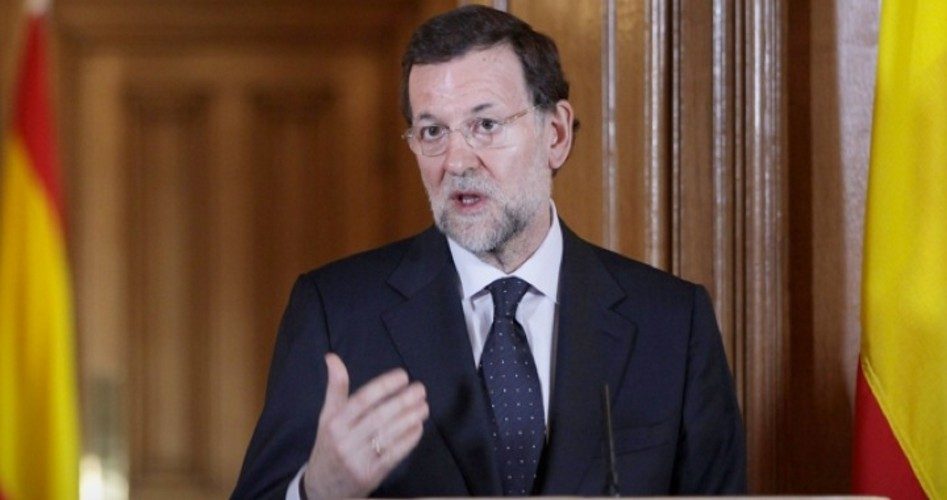
Following another last-minute late-weekend meeting of European Finance Ministers, Spain’s new Prime Minister Mariano Rajoy happily announced that not only was his country going to get more bailout funds than it needs, it’s coming without any strings attached. This is because, according to Rajoy, the new measures instituted since the victory of his People’s Party last November have been so effective in bringing common sense and prudent behavior back to the country’s financial markets. Those “radical” fiscal, labor-market, and financial-sector reforms that were instituted were the key, he said, adding,
If we hadn’t done this in these past five months, what was put forward [on Sunday] would have been a bailout of the Kingdom of Spain. Because we had been doing our homework for five months, what did happen … what was agreed, was the opening of a line of credit for our financial system.
There is no conditionality of any kind.
According to a report by the International Monetary Fund (IMF), Spain needed at least $50 billion to rescue and recapitalize its banks. But the Finance Ministers decided to up the ante significantly, to $125 billion, just to be safe. Said Olli Rehn, the European Union’s top economist, “This is a very clear signal to the markets, to the public, that the Eurozone is ready to take determined action.” He added, “We deliberately wanted to ensure there is some additional safety margin…. This is preemptive action.”
What Rajoy failed to mention is that there are most certainly strings attached, and when the deal is finally written and signed off on by the Eurozone’s 17 members sometime later this month, those strings will in fact be cords and chains that will limit Spain’s sovereignty in favor of the union.
First of all, this “line of credit” is nothing like a second mortgage or home-equity loan, taking a secondary position behind primary lenders or lien holders. When doing business with the European Stability Mechanism (ESM), Rajoy will be dismayed to learn that that line of credit will take primary position in the event of default, forcing those bondholders who thought they were first in line into a secondary, and much more risky, position. That will be reflected immediately as the value of those holdings will decline along with the realization that Spain has done little if anything to improve its financial situation.
Second, that line of credit will be added to the already staggering $700 billion that Spain’s government already owes its lenders. It simply hastens the day when another bailout, and another, will be needed.
Thirdly, the actual amount coming from the ESM will not be determined by Rajoy or his government. Officials from the ESM will invade Spain and scour the government’s books and records and then apply what they think will be the appropriate and proper amount to keep Spain afloat for a while. As noted by the Financial Times, “The commission is expected to impose tough new measures on Spain’s financial sector overhaul, which some officials believe has gone too slowly and [has] contributed to market uncertainty.”
Put all together, that “line of credit” with no strings attached is indeed coming at a cost: national sovereignty in financial matters to an unelected body using money as a lever to gain control.
One of those seeing clearly is Gary Jenkins of Swordfish Research Ltd. in Amersham, England. In a note to his clients, Jenkins said: “While Spanish politicians tried to claim that this was not a bailout, it is of course a de-facto bailout of Spain.”
There is little confidence that sending good money after bad will have any positive impact in Spain. Economists at Exane BNP Paribas said in comments to its customers that there is now even less of a chance that Spain will be able to pay back any of its enormous, and soon to be substantially larger, national debt:
In the absence of decent nominal growth and given the still high fiscal [annual] deficit, it would be optimistic to think that Spain will not require [additional] official assistance to soften is debt burden.
On Monday the markets initially reacted positively to news of Spain’s new noninvasive “line of credit,” but it didn’t take long for bondholders to see through Rajoy’s unjustified optimism: Sensing the increased likelihood that Spain will never pay them back, bondholders have increased the costs of financing Spain’s existing debt. Interest rates demanded on Spain’s 10-year notes jumped significantly, approaching what many experts consider to be the unsustainable seven-percent level.
Spanish default is coming. This latest “line of credit” merely hastens the day.
Photo of Mariano Rajo: AP Images


